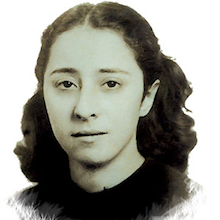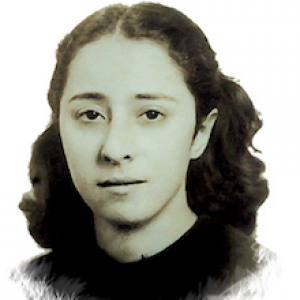Nazik al-Malaika The complete works was our book club selection for September 2006
Find more information on the author and readers discussion on the book's page.
Iraqi poet and critic, one of the most important Arab women writers. Al-Mala'ika was a major advocate of the free verse movement in the late 1940s with Badr Shakir al-Sayyab. Her poetry is characterized by its terseness of language, eloquence, original use of imagery, and delicate ear for the music of verse.
Stay as you are, a secret world
Not such thing as a soul discerns
Spinner of poems, the last muse
In a world whose mirrors are dimmed
What song did not flow with honey
If you were to smile your praise upon it?
(from 'Song for the Moon')
Nazik al-Mala'ika was born in Baghdad into a cultured, literary family. Her father was a poet and the editor of a 20-volume encyclopedia. Her mother, Um Nizar al Mala'ika, wrote poetry under the pseudonym Omm Nizar Al-Malaika against the British rule. Al-Mala'ika started to write already in her childhood, and at the age of ten she composed her first poetry in Classical Arabic. She was educated at the Higher Teachers' Training College in Baghdad, earning her B.A. in 1944. While still in college, she published poems in newspapers and magazines. As a student she registered in the musical instrument oud (the Middle-Eastern lute) department of the Fine Arts Institute, and attended classes in the acting department. Her knowledge of English literature earned her a scholarship to study at Princeton University, New Jersey.
In 1954 Al-Mala'ika continued her studies at the University of Wisconsin, where she obtained an M.A. in literature. Al-Malaika worked as a university lecturer and professor. In 1961 she married Abdel-Hadi Mahbouba, her colleague in the Arabic department at the Education College in Baghdad. With her husband, she helped found the University of Basra in the southern part of Iraq. Al-Malaika taught many years at the University of Kuwait, and in 1985 a festschrift appeared in her honor. It contained twenty articles on her work. In 1990 al-Mala'ika was forced to return home by Saddam's invasion. After fleeing from Iraq in the aftermath of the Gulf War, she moved to Cairo. Although she has avoided publicity, Al-Mala'ika again entered the literary scene in 1999 with a new book of verse, Youghiyar Alouanah Al-Bahr. The bulk of the poems were written 25 years ago in 1974. The book also contains an autobiographical sketch.
As a writer al-Mala'ika made her debut in 1947 with A'shiqat Al-Layl. Its themes of despair and disillusion were familiar from the Arabic literary romanticism of the 1930s and 1940s. Her second collection, Shazaya wa ramad (1949, Ashes and Shrapnel), helped launch free verse as a new form for avant-garde poetry. The old two-hemistich mono-rhymed form had flourished unchallenged for fifteen centuries. Experiments outside the rigid structures started in the beginning of the 20th century, but it was not until the mid-forties that poets succeeded in creating an acceptable form of free verse. Al-Mala'ika's book contained eleven poems and an introduction, in which al-Mala'ika explained the advantages of the new rhyme patterns as opposed to the old.
In the 1950s al-Mala'ika was among the most prominent figures of modernism, and backed the movement with her critical writings, when arguments were thrown for and against metrical poetry. With one of her best-known poems, 'Cholera', was based on the emotional effect of the cholera epidemic that arrived from Egypt to Iraq in 1947. "The night is silent/Listen to the effect of groans/In the depth of darkness, below the silence, on the dead." Taking the subject from recent history, she first time demonstrated the possibilities of the modern verse. However, this poem still followed a certain rhyme scheme. Al-Mala'ika's collected articles, Qadaya 'l-shi'r al-mu'asir (1962), continued the debate for more sophisticated expression, and developed further some of the principles formulated in the introduction of Shazaya wa ramad.
Why do we fear words?
Some words are secret bells, the echoes
of their tone announce the start of a magic
And abundant time
Steeped in feeling and life,
So why should we fear words?
(from 'Love Song for Words')
Al-Mala'ika has also been a strong defender of women's rights. Her two lectures from the 1950s about women's position in patriarchal society, 'Woman between passivity and positive morality' (1953) and 'Fragmentation in Arab society' (1954), are still topical. In the late 1960s al-Mala'ika started to distance herself from experimentalism and developed more moralistic, conservative views-she also wrote religious poems and often used the two-hemistich form. Al-Mala'aika has kept a diary all her life; she still plays the oud she studied in her youth, and likes to sing the songs of Omm Kulthoum and Mohamed Abdel-Wahab. Al-Mala'aika has translated poems by such writers as Byron, Thomas Gray, and Rupert Brooke, but in the 1960s she also criticized young writers who have embraced too uncritically Western models.
For further reading: The Poetry of Arab Women: A Contemporary Anthology, edited by Nathalie Handal (2000); Zwischen Zauber und Zeichen. Moderne arabische Lyrik von 1945 bis heute, ed. by Khalid Al-Maaly (2000); Encyclopedia of World Literature in the 20th Century, vol. 3, ed. by Steven R. Serafin (1999); 'Nazik al-Mala'ika's poetry and its critical reception in the West' by Salih J. Altoma, in Arab Studies Quarterly (09/22/1997); Reflections and Deflections by S. Ayyad and N. Witherspoon (1986); Women of the Fertile Crescent: Modern Poetry By Arab Women, ed. by Kamal Boullata (1981); Middle Eastern Muslim Women Speak, eds. E.W. Fernea and B.Q. Bezirgan (1977); Trends and Movements in Modern Arabic Poetry by Salma Jayyusi (1977); Literatura árabe by J. Vernet (1968) - For further information: Jasmine - When the sea changed its colour - Unidad Árabe y Arabidad en la Obra de la Poetisa Názik al-Malá'ika - See also: 'Abd al-Wahhab al-Bayyati -
SELECTED WORKS:
* A'shiqat Al-Layl, 1947
* Shazaya wa ramad, 1949
* 'Al-mar'a baina 'ltarafain, al-salbiyya wa 'l-akh-laq', 1953
* 'Al-tajzi'iyya fi 'l-mujtama' al-Arabi', 1954
* Qarárat al-mawya, 1957
* Qadaya 'l-shi'r al-mu'asir, 1962
* Al-Sawma'a wal-Shurfa Al-Hamraa, 1965
* Shaýarat al-qamar, 1968
* Ma'sát al-hayát wa ugniya li-l-insán, 1970
* Al-taýzi'iyya fi-l-muýtama' al-'arabi, 1974
* Yugayyir alwána-hu l-bahr, 1976
* Li-l-salat wa-l-tawra, 1978
* Sykolojia Al-Shi'r, 1979
* Youghiyar Alouanah Al-Bahr, 1999
* Al-Aamal Al-Nathriya Al-Kamila, 2002 (2 vols.)
* Al-Aamal Al-Shi'riya Al-Kamila, 2002
Nazik Al-Malaika
IraqUpcoming Events

Sonallah Ibrahim's Ice
June 26, 2025
Join us for a special discussion on Sonallah Ibrah...

Arabia Felix - Alarabia Alsaida in Bayt Yakan
April 15, 2025
Arabia Felix by Thorkild Hansen, and translated by...

A writer, a vision, a journey: a conversation with Professor Ilan Pappe
March 15, 2025
This event took place on 15 March, 2025 . You may...

مسافر يبحث عن ماء
February 17, 2025
تقيم نقابة اتحاد كتاب مصرشعبة أدب الرحلات تحت رعاي...


